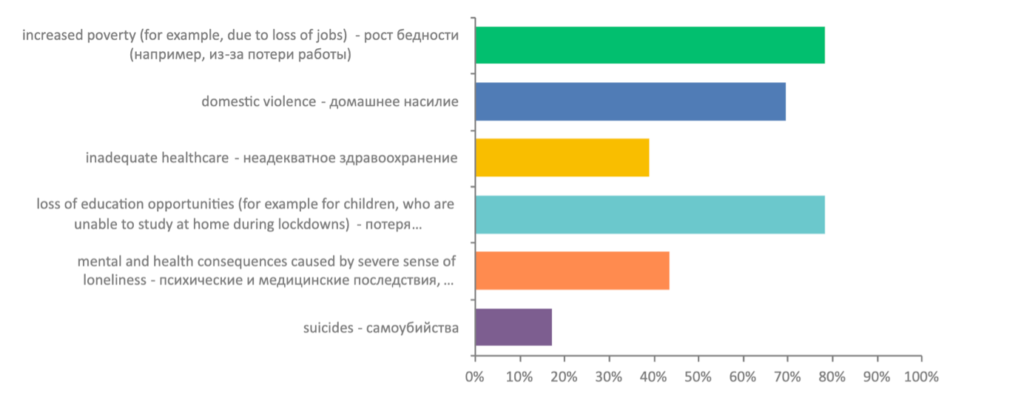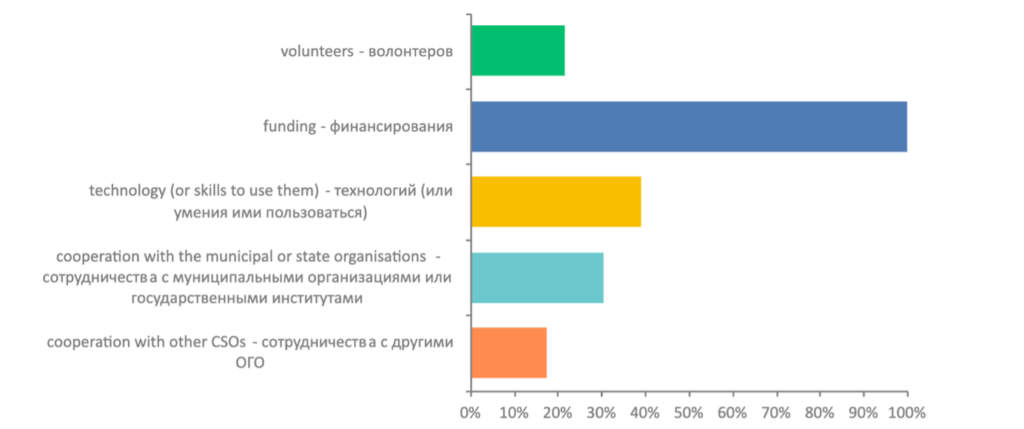2022 CSO Survey – Results
In February 2022, BEARR launched a survey to facilitate the sharing of ideas, best practices and innovative approaches to working with vulnerable groups suffering from social isolation due to the ongoing COVID-19 pandemic. The results of the survey were to later form the basis of a webinar on the same topic. However, this work was interrupted by the full-scale invasion of Ukraine. As a result, we have received a comparatively small number of responses (23) in contrast to previous years, and we were unable to hold the webinar as planned.
The responses we did receive covered a large number of the countries we work with (9 out of 12), including: Armenia, Azerbaijan, Georgia, Kazakhstan, Kyrgyzstan, Tajikistan, Turkmenistan, Ukraine, and Uzbekistan. Here are the key findings from the responses:
Key findings
Respondents identified the groups suffering the most from social isolation caused by the COVID-19 pandemic as:
- the elderly (78%)
- people with disabilities (61%)
- and children & youth (52%).
Other marginalised groups mentioned in responses include LGBTQ people, victims of domestic violence, labour migrants, and people living in remote rural areas.
Of the main factors contributing to social isolation, the direct result of COVID measures had the most negative impact, with lockdowns and job losses identified by 70% and 87% of respondents respectively.
Other notable factors contributing to social isolation include discrimination and intolerance of marginalised communities (9%) and geographic location (9%).
CSOs working with marginalised groups, especially LGBTQ communities, found that pre-existing social stigmas and intolerance intensified during the pandemic.
The main consequences of social isolation were identified as:
- increased poverty & loss of access to education (78%)
- domestic violence (70%)
- negative impact on mental health (43%)
Other consequences include an increase in crime and violence among marginalised groups (9%), increased discrimination, greater inequality of opportunity and human rights violations.
Q3: From your experience, what are the main consequences of social isolation in different groups?

100% of respondents reported funding as the resource that CSOs were lacking the most.
Q5: What resources have you lacked the most?

CSOs in the region found the following groups most difficult to reach during the pandemic:
- marginalised groups (incl. LGBTQ people)
- victims of domestic violence
- vulnerable people living in remote rural areas
- youth in prison
- the elderly
- labour migrants and their families (incl. victims of human trafficking and undocumented migrants)
22% of responses mentioned women as hard to reach (incl. migrant women, deported women, victims of domestic violence, rural women and single mothers);
22% mentioned migrants and their families;
17% mentioned rural populations, who often don’t have access to local or international aid;
9% mentioned adults and disabilities;
1 respondent didn’t mention a particular group, but found that due to a lack of resources or state assistance, they were unable to provide services to the vast number of people who were in need of support due to the pandemic.
Working with socially isolated groups during the pandemic has affected CSOs and their staff in a number of ways, both positive and negative.
Negative impacts include:
- Loss of staff and volunteers
- Loss of income and reduced access to grants
- Depression, exhaustion and burn out
- More appeals for help than usual to CSOs without the capacity to expand their reach
- Inability to provide adequate levels of care via online/remote methods
Positive impacts include:
- Mastering of new technologies
- New skills
- New partnerships
- Time to research and develop solutions to systemic problems (incl. structural injustices, legislative loopholes, and a recognition of the need for a state-sanctioned base level of care and services for vulnerable groups)
In order to strengthen their organisations and to support their staff, CSOs implemented the following measures:
- Flexible working-from-home hours for staff
- Access to psychological support
- Self-help groups
- Recreational activities once lockdown restrictions were lifted
- Working alongside state authorities to more effectively deliver services
- Offering online training and increased digital competency
Regional contexts (such as the war in Artsakh, pre-existing social stigmas or inefficient state services) combined with the impact of the pandemic increased the workload of CSOs, who were already struggling with internal difficulties caused by COVID-19.
High interest in a webinar on social isolation, with 86% of respondents interested in hearing from other CSOs & 76% reporting their personal interest in the topic
A full review of the survey results can be downloaded here.
Anna Lukanina-Morgan and Alexia Claydon
January 2023

